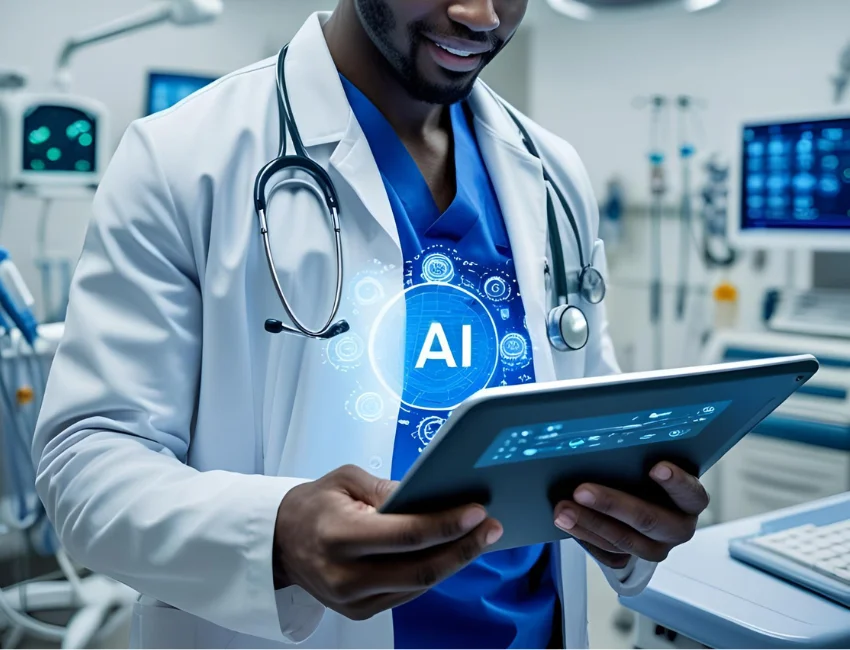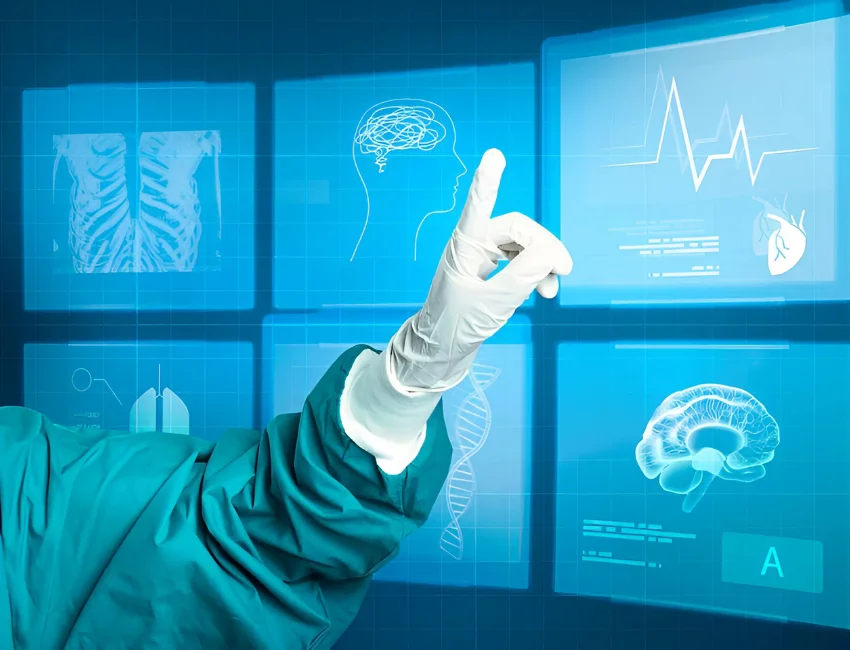

AI is used in the healthcare sector to detect diseases, predict outcomes, personalize treatment, and automate administrative tasks. Common applications include image-based diagnostics (e.g., radiology), patient data analysis for early warnings, drug discovery acceleration, and virtual health assistants that improve patient engagement and efficiency.
AI is changing the operations of the healthcare industry by improving diagnostics, patient management, and even medication development. The narrative of ai application healthcare sectors has dramatically shifted into actionable solutions that facilitate planning, quick action, and precise outcomes in clinical settings.
Contemporary AI systems guarantee the privacy of patients, legal compliance, and exact medical outcomes. These systems are enabling hospitals, drug companies, research laboratories, and even MedTech startups to implement advanced and precise methods of delivering healthcare services.
This is the age of precise AI targeting. From recognizing unique clinical conditions to restructuring hospital activities for better flow, AI systems are designed to train, adapt, and assist in life-saving procedures. The revolution in healthcare is happening, and AI technology is driving it.
The emerging ai application healthcare vertical is addressing persistent challenges in diagnostics, clinical workflows, and patient management. Predictive and proactive models of care are being incorporated into hospitals and clinics with the help of AI-based applications, as opposed to reactive methods that were previously employed.
AI helps in cost reduction and risk mitigation by automating administrative processes, parsing extensive health data, and making predictions with precision. Smart systems are currently used by clinics for image diagnostics, chronic care planning, and post-treatment monitoring.
Not only does AI aid nurses and doctors, but non-medical staff administrators are also supported by AI when it comes to identifying hospital workflows, automating appointment scheduling, mental healthcare, and even automating insurance claim filing. This leads to improved decision speed, enhanced results in care, and increased patient satisfaction.

Clinical decision-making has improved with the application of AI algorithms which makes use of historical and contemporary data, including a patient’s medical history, lab tests, genetic data, and even data obtained from wearables, to build predictive models.
Such models enable healthcare practitioners to identify diseases early on and tailor treatments much more accurately. AI optimizes emergency room triage, minimizes the chances of readmissions, and detects fine details that are usually overlooked.
These advanced decision-making aides are changing how hospitals provide care by enabling personalization, increasing reliance on evidence, and ensuring prompt services. The application of machine learning allows systems to continually enhance the decision-making process and strengthen the health system over time.
The integration of AI into the healthcare system has become a prerequisite. Below are four domains that ai application healthcare industry is centered around:
Medical datasets are used to train AI models that aid in recognizing disease symptoms, providing outcome forecasts, and treatment tailoring. These ML models improve ICU alert systems, enhance early detection of chronic diseases, risk evaluation and stratification and patient monitoring, and improve precision through continuous learning.
Advanced forms of neural networks analyse radiology scans, genomic sequences, and other clinical notations. Because of their multitask capability, they can evaluate several datasets at once, which can be useful in diagnostics, treatment tailoring, biopharmaceuticals, and other fields.
These technologies help x-ray, MRI, and CT scan Computer Vision performs x-ray, MRI, and CT scan analysis at incredible speeds and accuracy not equalled even by human professionals. They assist radiologists with anomaly detection, disease progression, and subject matter prioritization, thus reducing human error and increasing quantum leaps.
The use of artificial intelligence powered Intelligent Automation automates repetitive tasks such as billing, patient intake and scheduling, and appointment setting. It eliminates a lot of manual work and thereby reducing errors in the healthcare establishments enabling them to provide better healthcare services with the help of optimized staffing and resource allocation.

Applications of AI are addressing specific challenges in the entire healthcare domain, and there are many examples for the same. Following are the areas which we consider the most important when it comes to the application of AI:
AI uses patient’s genomes along with their lifestyle and medical history to formulate a customized treatment. These tools are shifting the healthcare landscape towards a future where caregiving is virtually hyper-personalized by allowing more accurate therapies, proactive interventions, early detections, and tailored approaches.
These systems assist in guiding caregivers by providing valuable insights based on the patient’s behavioral data, voice tones, and mood patterns. AI systems improve therapy sessions for anxiety, depression, PTSD, and other emotional disorders.
AI software helps radiologists by marking abnormalities, relating them to previous scans, and assisting with faster image interpretation. These systems aid in better decision making during critical work situations and reduce the possibility of errors.
AI powered devices allow real time monitoring of the patient and remote consultations via smart devices. There is continuous tracking of vitals with the possibility of immediate detection of anomalies and automatic alerting of caregivers, thus extending care outside the hospital.
AI practices efficient analysis of trial data, participant screening, and refining of design of the trial. This increases the success rate and decreases the time and cost of drug development. AI also helps in medical discoveries.
AI aids pharmaceutical companies in predicting molecular interactions, identifying drug candidates, and shortening the entire drug development process. In turn, the companies also enjoy fast discovery, better design of compounds, and better use of resources.
AI handles the management of patient flows, appointment bookings, and allocation of medical staff and instruments. Subsequently, the entire department operations are enhanced and delays are reduced.
AI monitors suspicious events, stops insurance fraud, and protects confidential medical records. Such tools are fundamental to maintaining compliance, and trust within, the digital healthcare framework.
Wellness AI platforms utilize biometric and behavioral data to provide valuable pointers about stress management. Individuals can now monitor their wellness proactively before these conditions worsen.
AI is more than just a backend digital assistant; it serves countless stakeholders in the healthcare system:
Hospitals can reduce waiting time and better their patients’ care through the integration of AI and advanced diagnostics. AI powered triage, automated diagnostics, and complication prediction are only a few of the services offered.
AI has drastically increased the accessibility of wellness platforms, health tracking devices, and diagnostic applications. Within these categories, innovation ranges from mental health chatbots to wearable AI.
Drug development can benefit from AI technology by modeling chemical reactions, screening compounds, and predicting side effects. The availability of AI discovery tools allows researchers to draw insights and conclusions with greater efficiency and depth.
AI applications related to the deciphering of complex biological systems, structure analysis of proteins, and laboratory automation are helping push boundaries in biotechnology, disease modeling, and bioinformatics.
We help companies overcome healthcare challenges using crafted AI solutions tailored to fit existing needs. Here’s how we differ:
With the help of predictive diagnostics, real-time interventions, and personalized treatments, AI will continue to enhance the healthcare ecosystem. Algorithms and datasets available to physicians are becoming more extensive, which helps doctors take faster, more informed actions, even in the case of patients who do not display symptoms.
AI will change job definitions by allowing clinicians to concentrate more on patients while repetitive tasks will be automated. Precision care at scale, resource management, and outbreak detection are just a few things hospitals will use AI for.
The AI application healthcare sector is evolving toward providing insights, seamless care coordination, and early warning detection, making the intelligence in it proactive rather than reactive.
Tailored AI applications in healthcare make WebOsmotic your trusted partner. Our applications are designed to deliver speed, accuracy, and security, whether you are building smarter diagnostics, enabling remote care, or optimizing drug trials.
Would you want a custom solution for your healthcare services? Contact us today to learn how our competencies with AI technologies will meet your precise specifications.